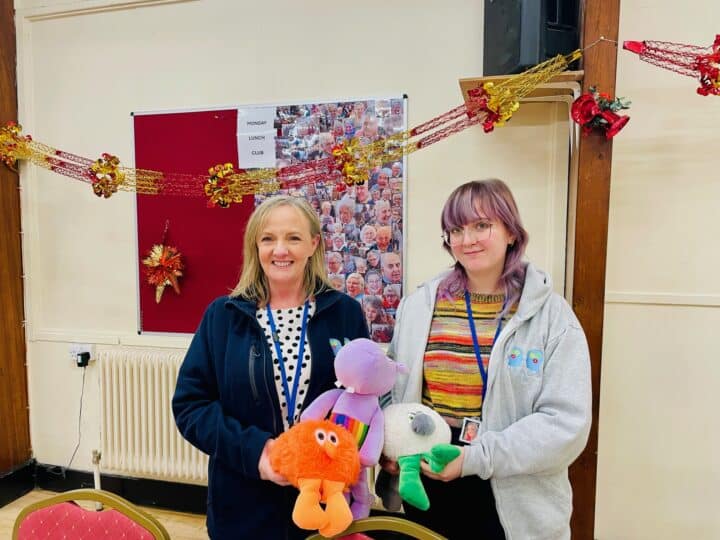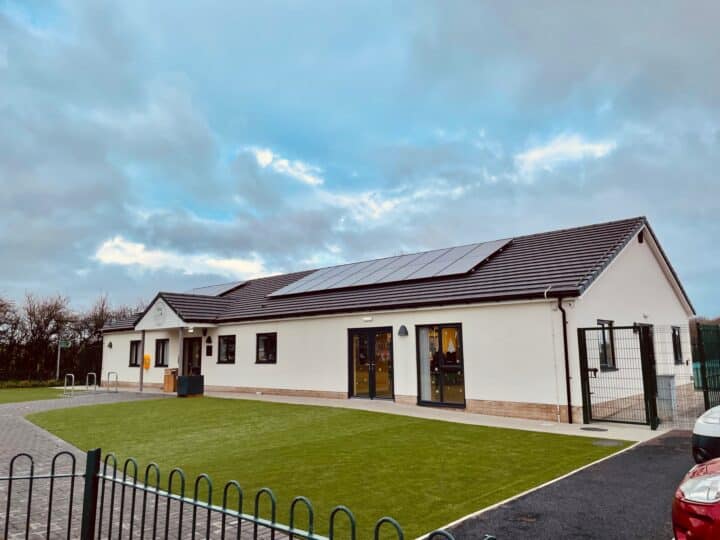-
About
About
Local Trust is a place-based funder supporting communities to achieve their ambitions.
Find out moreGo straight to…
< Back to main menu -
Big Local
Big Local
Big Local is an exciting opportunity for residents in 150 areas to create lasting change in their communities.
About the programme< Back to main menuSupport centre
Essential guidance, information and ideas for Big Local partnerships, to help you deliver change in your community.
Visit the support centre -
Other programmes
Other programmes
Find out how the principles of Big Local have inspired other programmes creating change in local communities.
< Back to main menuCommunity Leadership Academy
Supporting volunteers involved in Big Local projects to develop their skills and knowledge.
Find out moreCreative Civic Change
This new approach to funding enabled communities to use art and creativity to make positive local change.
Find out more
-
News and stories
News and stories
The latest news and stories from Big Local areas and beyond, exploring community power and resident-led change.
ExploreGo straight to…
< Back to main menuVoices of Big Local
Inspiring stories from the people making change happen in their communities.
Read more - Insights
- Policy

-
About
About
Local Trust is a place-based funder supporting communities to achieve their ambitions.
Find out moreGo straight to…
< Back to main menu -
Big Local
Big Local
Big Local is an exciting opportunity for residents in 150 areas to create lasting change in their communities.
About the programme< Back to main menuSupport centre
Essential guidance, information and ideas for Big Local partnerships, to help you deliver change in your community.
Visit the support centre -
Other programmes
Other programmes
Find out how the principles of Big Local have inspired other programmes creating change in local communities.
< Back to main menuCommunity Leadership Academy
Supporting volunteers involved in Big Local projects to develop their skills and knowledge.
Find out moreCreative Civic Change
This new approach to funding enabled communities to use art and creativity to make positive local change.
Find out more -
News and stories
News and stories
The latest news and stories from Big Local areas and beyond, exploring community power and resident-led change.
ExploreGo straight to…
< Back to main menuVoices of Big Local
Inspiring stories from the people making change happen in their communities.
Read more - Insights
- Policy

The pink ladies of Scotlands and Bushbury Hill
Our journalist-at-large, Harriet Marsden, travels to the Venture Centre in Scotlands and Bushbury Hill Big Local to meet local community workers known as the Pink Ladies.
When I ask community worker Kim Payne to share her most enduring memory of the pandemic, she answers: “It was the way that the volunteers at the centre came together when Covid hit – this is like their heart, their baby, this is their lives.”
The centre she describes is the Big Venture Centre, the “beating heart” of Scotlands and Bushbury Hill Big Local. The volunteers – all women – wear eye-catching pink shirts.
In the concrete garden behind the centre, the pink ladies and I sit in a circle of cigarette smoke and warm gossip. It’s clear from the off that this is more than just a group of volunteers with a common purpose. There is a familial warmth that only comes from shared emotional bonds.
The area, to the northeast of Wolverhampton, is two disparate estates on the ground. The neighbourhoods, of about 1,000 households each, are divided by a road – and historic mistrust. Some on the Scotlands estate complain that those on Bushbury Hill get all the best housing and investment, despite intense deprivation and unemployment on both sides. In 2017, the city council announced that they would be closing the Adventure Playground on the Scotlands estate, due to budget cuts.
The chair of the Scotlands and Bushbury Hill Big Local, Karen Trainer, says: “We told them we’d already lost one community centre, and we didn’t want to lose this one.” Residents campaigned for an asset transfer, won the lease on the building for 25 years and invested nearly £200,000 in renovations. The Centre now hosts a range of community activities, from cooking classes to clothes drives, for the whole area.
So it doesn’t surprise me when Kim says: “When the centre got shut during lockdown, it was like they were devastated. And it was like the beating heart had stopped.”
A few weeks into lockdown, the team realised that the community needed help more than ever. Both estates were suffering from devastating job losses and listless furlough. “There were people out there that hadn’t got any money,” Kim says, “and so the volunteers decided they were going to do something.”
Karen, with her brood of pink ladies, says: “We need to be there, they can’t come to us. So we’ll go to them.”
Within a few days, they’d got bags of food ordered and delivered, and emergency parcels loaded up on the little minibus to deliver to families. The heart was beating again.
But the community needed more than just food. Kim, who has been working in the area for nearly 27 years, has a good understanding of local needs – but even she didn’t know that men’s mental health was as bad as it was. Kim explains: “We had more men come forward than we’ve ever had before. There was a massive impact on men’s mental health that we didn’t realise.”
The fathers, she says, had always been in the background “you didn’t see many of them. But then all of a sudden they were the ones walking down to the shops with the children, and even down to the shopping lists, they didn’t know what to get … it’s quite traumatic for them, so they lose all their confidence, their self-worth.”
When roles are reversed, she says, it knocks everything else. “They’ve been the provider and now they can provide nothing, and they’re not even good at what they are providing – childcare. And it’s really knocked them about. The pride is gone. Everything – it just got deleted.”
She explains that it was a confidence issue – “they’re providers of the family, and then all of a sudden, they’ve either been on zero-hours contracts and haven’t been reemployed, or they’ve had to change their roles and become the childcare provider while the partner goes out to work. They haven’t been able to adapt very well to looking after children.”
As Karen puts it, “The the men round here are very butch … it’s a big pride thing.”
So to support local men in their new roles, the pink ladies created a recipe book and taught basic cooking and budgeting skills. “The men loved it,” says Kim, “because they were actually doing something different. And that’s how we’ve taught them … in a fun way. And it was lovely to see the pictures of the dads cooking with the children.”
The group received a Queen’s Award for Voluntary Service in recognition of their efforts.
Fern Lowndes, one of the pink ladies, describes the role exchange that occurred between her and her partner. “Dad was always the worker, and then when he was furloughed, I went into employment, while still volunteering here too. So it was a big eye-opener for dads, being house husbands and seeing what mums have to do.”
Born in Birmingham, Fern has lived on the Scotland’s estate for 13 years. She and her partner, who have been together 25 years, have seven children – and she says he’d always been involved, but this was much more “full on”. “Before he could be in the background, but now it was dad dad dad…I need this, I need that.”
The Centre provided more than just cooking support. They were also a safe house for socially distanced contact, and helped local men access counselling services, mental health support, GP appointments and even medication.
Fern’s partner Scott also suffers from anxiety and poor mental health. Just before lockdown, he had begun to come into the centre to speak to Karen, who had advised him to seek help. “It was Karen being on his back, that he actually went to the doctors and got the help he needed … At times he got very stressed, but the centre was there to back him up when he needed support.”
Earlier this year, the group received a Queen’s Award for Voluntary Service in recognition of their efforts. The success of the pink ladies, and the dynamism of support workers Kim and Louisa Edwards, have led to a collaboration with other nearby organisations, now known as the WV10 Consortium.
Louisa, who lives in nearby Dudley, has been working in the area for about ten years, as long as Big Local has been operating there. She describes the pink ladies as “not just fantastic advocates for the local area, but also examples of what you can achieve, because this place wouldn’t be here without them. It’s amazing.”
The communities of Scotlands and Bushbury Hill are, relative to the region, extremely diverse, with 20 per cent non-white residents. But deprivation on every metric stalks both sides equally. According to ONS data, nearly 30 per cent of adults in England’s most deprived area experienced depressive symptoms last year, compared with less than 20 per cent in the least deprived area. That’s also more than double the rates observed before the pandemic. While women are still more likely to experience depression, the impact of furlough and job loss on male mental health was more marked. The number of men who take their own life is about three times higher than women.
“We knew that people had issues that needed to be addressed, but we didn’t know how deeply embedded they were in the community.”
In Scotlands and Bushbury Hill, says Karen, the men are “very much men’s men. They don’t show their feelings. They don’t ask for help. They’re very grim and bear it … it was only through lockdown that the mental health of men came to the fore. Before, it was secret. Nobody knew.”
Issues were coming to the surface, she says, “because they’d nowhere to go. They were stuck inside … and that’s what lockdowns taught us, that the men have got as many issues as the women, that they’re starting to talk about.”
Kim says that while the pandemic has been devastating, it also helped the team identify needs within the community. “It’s helped to embed the priorities that were set through the Big Local plan,” she says. “We knew that people had issues that needed to be addressed, but we didn’t know how deeply embedded they were in the community.”
As Fern puts it, “The centre supports all of us, the whole family. And they’re my extended family.”
Harriet is Local Trust’s journalist at large. She is travelling the country meeting communities in Big Local areas and writing about their stories.
If your Big Local has a story to share, a project you’re keen for Harriet to come and see, or if you just want to say hi and have a chat, get in touch via email or Twitter.




